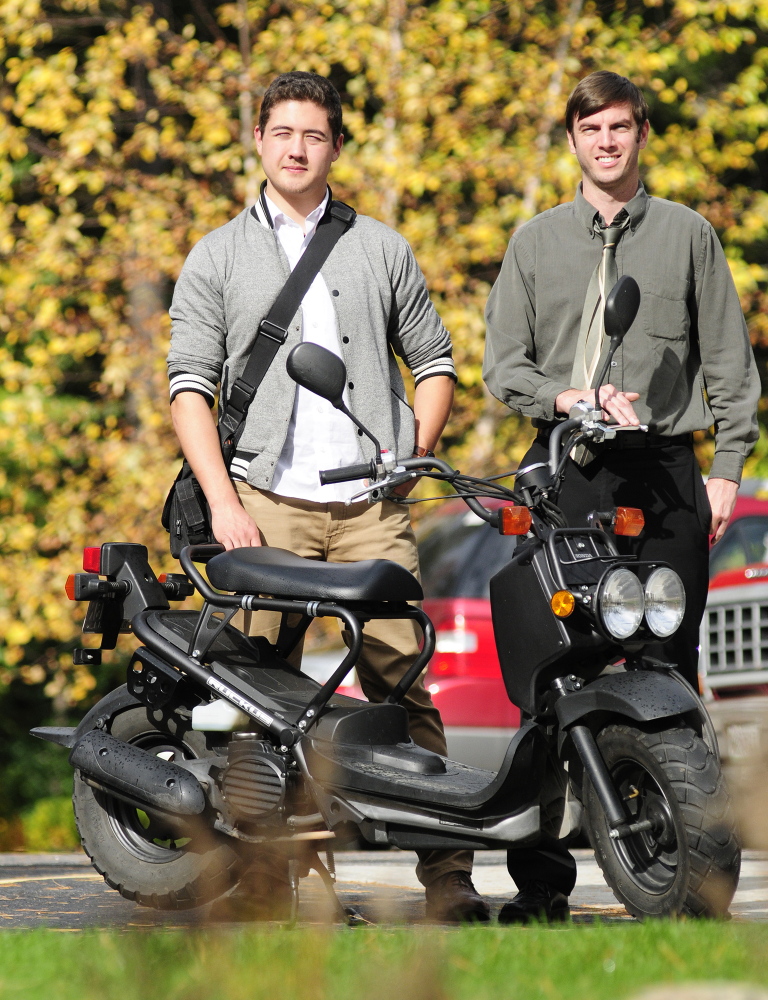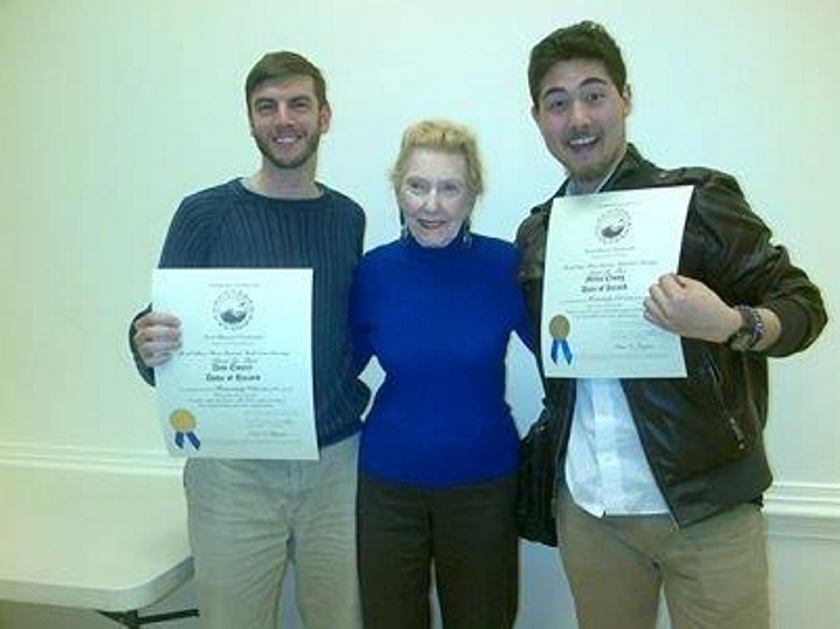A bit more than 100 days and some 4,000 miles into a 48-state, 48-week tour to explore hunger across the country, Augusta residents Dan Emery and Myles Chung have been uplifted by the overall goodness of people, threatened by a fellow occupant of a homeless shelter, and named official Dukes of Hazard.
They’ve found hunger to be a problem nearly everywhere they’ve been, and they’ve ridden their scooters in the snow and below-zero temperatures. They have some potential solutions to hunger they think might help address the problem back home in Maine.
For now, one of their most common pressing needs is a place to lay their heads at night. They can’t afford to blow their tight travel budget on their slow-moving tour meant to raise awareness of hunger.
“Right now we’re in Biloxi, Mississippi, where we couldn’t find lodging; so we’re tenting for the week, on the site of an old casino that was taken out by Katrina,” Emery, 30, said last week. “We expect that’s going to happen a lot more often now. We’ve only got three or four days covered, with lodging, over the next eight or nine weeks of our trip. That brings some anxiety, when you hit the road, not having a place to sleep.”
Emery, a former Augusta City Council member, said his overall experience on the cross-country trip so far has left him hopeful.
“We’ve met a lot of really great people doing some really cool things,” Emery said. “We’ve all got challenges, but we’ve found a sense of community. People have been really kind.”
Some of the most helpful people they’ve encountered on their trip have been those with very little of their own. They were tipped off about the location of their makeshift campsite in Biloxi by a couple living in their car. And a homeless man in the Appalachian Mountain town of Hazard, Ky., who said he hadn’t eaten in days and had lost his house, wife and daughter in a fire, gave them directions to places where they could stay in that area. He even refused their offer to share their food with him.
During their week in Hazard, they met with many locals, were appointed official Dukes of Hazard by Mayor Nan Gorman, were interviewed by the local television news anchor, visited a cooking show and talked with locals about hunger.
The challenges there include the rural but rocky land, with few flat areas for farming, and isolation from major markets, making fresh produce hard to come by. Fast food, however, is prevalent there, as is obesity, perhaps not coincidentally.
Efforts to deal with hunger in Hazard included a farm-to-school initiative to show students where their food comes from and how to grow their own. That’s one thing Emery said they’ve come across that could help fight hunger locally when the return to Maine on Dec. 3.
Other things that seem to work in fighting hunger they’ve found so far include stops where municipally owned land, such as parcels acquired because of the owners’ failure to pay property taxes, is used to plant community gardens.
Food grown on those plots is shared with homeless shelters and food pantries.
Emery said programs teaching children things such as how to grow their own food can have long-term, far-reaching effects.
“Think about kids’ impact on their parents – previously with things like seat belts, and smoking, and how effective kids can be in implementing changes in their household,” he said. “If they have the ability to grow their own food, that’s a really good step.”
Unfortunately, Emery said, they’ve encountered at least some signs of hunger on every stop of their trip.
“Hunger has been an issue everywhere. Some places it’s more hidden than others,” Emery said.
Examples of food waste also have been prevalent on their travels.
Emery said America wastes 40 percent of its food, from production to consumption, which represents $165 billion in waste a year. He cited a study that indicates a 15 percent decrease in the amount of food thrown out, left uneaten, or otherwise wasted would provide enough food to feed 25 million people.
Programs they’ve found to help limit food waste include a Gather Baltimore program, in which the organization collects produce that farmers would discard because it won’t last long enough to bring it to market. It’s then redistributed to impoverished neighborhoods where it can be purchased for cents on the dollar.
Not all their lessons and trip experiences have been so positive.
Right at the start, on their first day of travel, Jan. 8, it was 11 degrees below zero when they left Massachusetts on their open, 35-mph Honda Ruckus scooters.
Emery said they stopped often to warm fingers that were so cold they were painful and tingly, and they did jumping jacks on the roadside or stepped into gas stations to try to warm up.
They have sets of studded tires for the scooters, for the snow, and they have not had any accidents or mechanical failures on the trip so far.
When they stayed overnight at a homeless shelter in Connecticut, another occupant threatened to kick Emery’s head in, though he didn’t act on the threat.
They also were pulled over by the police on the Chesapeake Bay Bridge in Maryland for going too slowly. The minimum legal speed on the bridge is 45 mph, about 10 mph faster than their scooters can go.
He said the officer who pulled them over chuckled when they explained what they were doing and gave them an escort the rest of the way across the 4-mile-long span.
Emery said Chung, 21, who was away in town getting their electronic devices charged up during last week’s interview, is doing well; and the two, despite the stresses of travel, are still getting along.
They watch their budget tightly and are avoiding hotels because the cost would blow their lodging budget.
One area of their budget that is doing well is money set aside for gas. Between both of their Ruckus scooters, which can top 100 miles per gallon, they’ve only spent $300 total on gas.
Their next stop is New Orleans.
Keith Edwards can be contacted at 621-5647 or at:
kedwards@centralmaine.com
Twitter: @kedwardskj
Send questions/comments to the editors.




Success. Please wait for the page to reload. If the page does not reload within 5 seconds, please refresh the page.
Enter your email and password to access comments.
Hi, to comment on stories you must . This profile is in addition to your subscription and website login.
Already have a commenting profile? .
Invalid username/password.
Please check your email to confirm and complete your registration.
Only subscribers are eligible to post comments. Please subscribe or login first for digital access. Here’s why.
Use the form below to reset your password. When you've submitted your account email, we will send an email with a reset code.